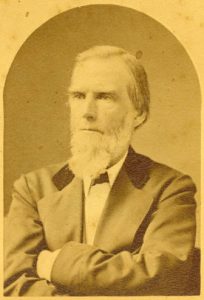“Good Cheer Prevailed” – Celebration and Reflection for a Confederate Surgeon in 1863 Arkansas
Christmas of 1863 was one of relief for the five-thousand men of the Confederate District of Arkansas. They had been settled in their winter encampment just west of Camden, Arkansas after months of battlefield defeats at Prairie Grove, Helena, and Little Rock. By Christmas Day, they felt relieved to know that Union Major General Frederick Steele’s Army of Arkansas did not pursue their retreat south and, instead, remained at Little Rock.

Major General Sterling Price’s surgeon, Dr. William McPheeters, recorded his war experiences in his small pocket diary, particularly reflecting on Christmas Eve and Day in 1863, while the Confederates hunkered down in their encampment. Before the war, McPheeters was one of St. Louis, Missouri’s most prominent physicians, but his Southern sympathies in a city under Union martial law proved contentious. He was arrested multiple times for not taking the loyalty oath, his five-year-old son passed away from an illness, and his house was ransacked twice before he made his way to Richmond, Virginia in the summer of 1862 to request a commission to serve on Price’s staff as a surgeon.
On December 24, 1863 Christmas Eve, McPheeters sat down to write an entry into his diary, “the return of this anniversary brings sad reflections.” Earlier that year, he and his wife Sallie had lost their oldest son George. Additionally, in his role as a surgeon, McPheeters witnessed firsthand the destruction and devastation of warfare, particularly in caring for the wounded and sick and for the health of General Price. He went on to write, “May [my family] be happy though we are separated and I a wanderer and a refugee living in a tent, but I repine not – our cause is just and I have no regrets for my course though it may cost me the loss of all my earthly possessions.”

The next day, Christmas Day, McPheeters took time to celebrate with his comrades. He wrote, “commenced the morning by making a big bucket of egg nog of which the General [Price] and most of his staff and other partook and seemed to enjoy hugely for it was good and good cheer prevailed.”
That evening, after enjoying “a good Christmas dinner,” the surgeon wrote to his family: “A merry Christmas to my dear wife and children – God bless them … how I long to be with them, but know not when that happy day will arrive – not until this cruel war is over. God speed its end and grant us an honorable peace and our independence with all the blessings of home and peace.”
During that Christmas of 1863, Dr. McPheeters – like other Confederates – continued to have a glimmer of hope for victory and a safe return home to family and friends. For this Trans-Mississippi Confederate, the remaining year-and-a-half of war was quite gloomy – his wife and children were banished from St. Louis, the Confederate cause west of the Mississippi River was sinking drastically, and the likelihood of Southern independence grew closer to impossible.
Source:
I Acted From Principle: The Civil War Diary of Dr. William McPheeters, Confederate Surgeon in the Trans-Mississippi. Edited by Cynthia De Haven Pitcock and Bill J. Gurley. Fayetteville: University of Arkansas Press, 2002.
Had the Founding Fathers only had known what would have become of their government that they worked and fought for for so long, only to have it replaced with a government that they feared.